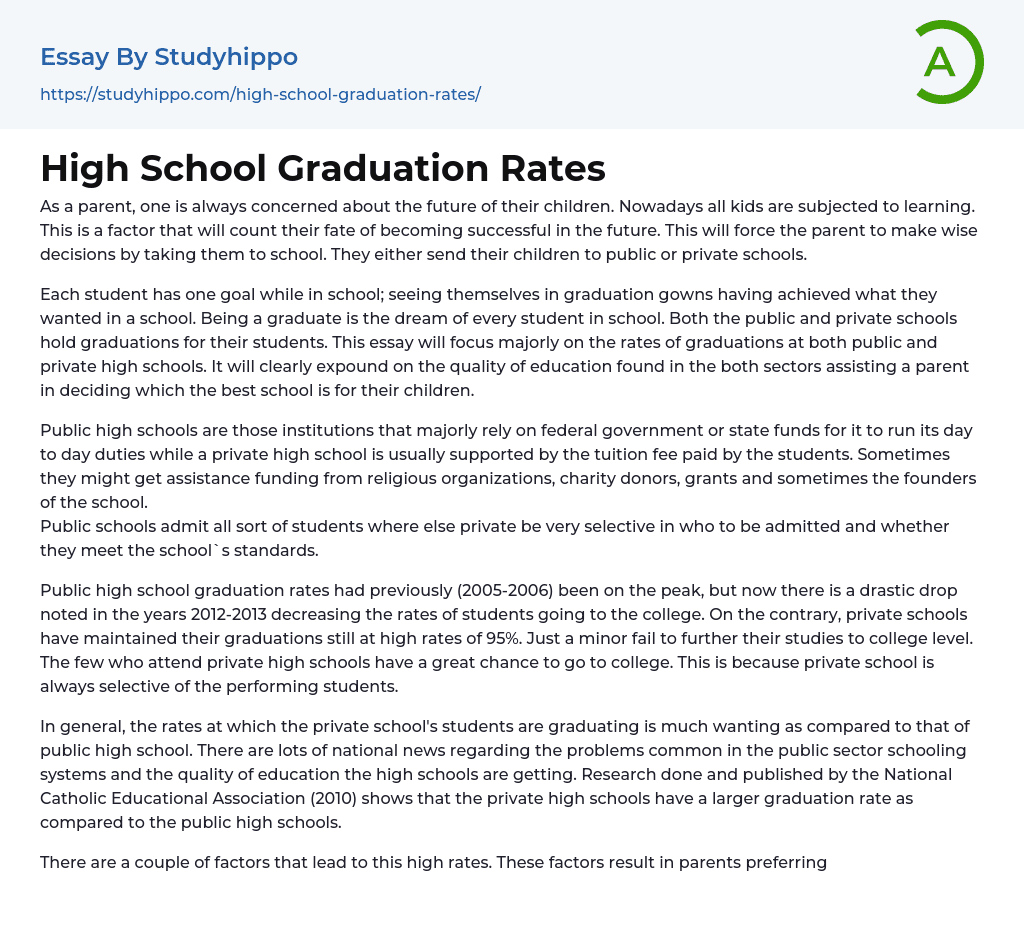Parents have the choice to send their children to either public or private schools, as they are concerned about their future and understand the importance of education for their success.
Regardless of whether they attend a public or private school, every student in school shares the common aspiration of envisioning themselves wearing graduation gowns, having achieved their desired objective. Graduating is the ultimate dream for all students. This essay will focus on analyzing the graduation rates of both public and private high schools.
The text highlights the disparities between public and private high schools, stressing the significance of comprehending the educational caliber in each domain while selecting the optimal school for children. Government funding serves as the main source of support for public high schools, whereas private high schools primarily rely on tuition fees. Moreover, supplementary backing may originate from religious institutions, benefactors,
...grants, and school founders. Public schools accept all students, while private schools employ discerning admission procedures contingent upon meeting the institution's requirements.
Between 2012 and 2013, public high school graduation rates decreased from their peak in 2005-2006. Consequently, there has been a decline in the number of students pursuing higher education. In contrast, private schools have consistently maintained a graduation rate of 95%, with only a small percentage of students not continuing to college. Choosing to attend a private high school significantly improves one's chances of getting accepted into college since these schools prioritize high-performing students through their selective admission process.
While public high schools often face criticism and media scrutiny regarding their quality of education, private schools generally have lower graduation rates. However, a study conducted in 2010 by the National Catholic Educational Association shows
that private high schools actually have higher graduation rates compared to public ones. This finding suggests that parents may choose private schools over public ones due to their superior performance.
The size of a school's population and its class sizes greatly affect academic performance. Overcrowded schools create obstacles for effective administration and monitoring. Public schools commonly face the issue of crowded classrooms, which hinders teachers in maintaining connections with students. On the other hand, private schools generally boast smaller class sizes that enable teachers to closely monitor each student.
This offers a great chance to correct mistakes and implement necessary measures, which is also advantageous for achieving positive outcomes. To be qualified for teaching in a public school, teachers must meet specific requirements such as obtaining state certification that verifies their education and college degree, as well as acquiring a teaching license. Additionally, teachers are required to comply with the No Child Left Behind Act to ensure their suitability for the position.
Private and public schools operate under distinct systems. In private schools, the students' board of governance has the power to terminate teachers and recruit more qualified substitutes. Conversely, private high schools have a superior graduation rate compared to public schools because of their inherent strengths. Nevertheless, certain public schools are also actively striving to enhance their graduation rates.
When parents are choosing between private and public high schools, they may feel uncertain about which option is best for their children. Factors such as competitiveness and rates of college acceptance can impact their decision-making process. However, it is important not to view one type of school as superior or inferior. Instead, parents should consider the factors that align
with their child's educational needs and goals.
The cost of a private school education may be too high for some parents, but others may prioritize the advantages it offers. Ultimately, the parent's choice of school significantly influences their child's future, fostering both moral and intellectual development.
- Plans after High School essays
- High School Experience essays
- Classroom essays
- College essays
- E-Learning essays
- Elementary School essays
- Examination essays
- Graduate School essays
- High School essays
- History Of Education essays
- Homeschooling essays
- Kindergarten essays
- Middle School essays
- Public School essays
- School essays
- Single Sex Schools essays
- Special Education essays
- Student essays
- Teacher essays
- University essays
- Vocational Education essays




